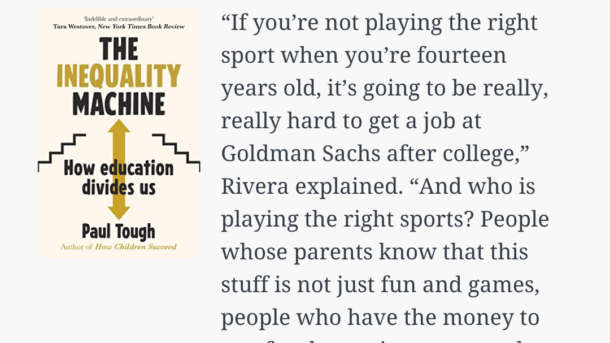To be hired by one of these elite firms, Rivera was told, it was not enough just to have played a sport. It also mattered which sport you played. Recruiters were mostly unimpressed by students who took part, even at a high level, in easily accessible sports like wrestling or basketball or soccer. Instead, they preferred candidates who played sports with a high barrier to entry, either because of specialized equipment or expensive club fees or both—sports like lacrosse, field hockey, tennis, squash, and rowing. Of course, these sports, as Rivera notes, are played almost exclusively by rich and upper-middle-class white kids. They generally require a serious commitment in time and money, not just from students but from parents as well, often beginning in middle school or even earlier. This created a system that was apparently open and meritocratic but that actually strongly favored young people from high socioeconomic backgrounds and eliminated the rest from consideration. “If you’re not playing the right sport when you’re fourteen years old, it’s going to be really, really hard to get a job at Goldman Sachs after college,” Rivera explained. “And who is playing the right sports? People whose parents know that this stuff is not just fun and games, people who have the money to pay for the equipment, people who know that lacrosse is this important insider thing.” People, in other words, with not just financial capital but also cultural capital, young people whose parents somehow intuited, in middle school, precisely which extracurricular activities their children’s investment-banking recruiters were going to be looking for a decade later, and who signed their kids up and shuttled them to and from practice accordingly. Meanwhile, low-income students at elite colleges mostly didn’t understand the rules of the game; they didn’t understand that in some cases, the starting whistle had sounded years earlier. “In contrast to students from upper-middle-class backgrounds,” Rivera wrote, “less affluent students are more likely to enter campus with the belief that it is achievement in the classroom rather than on the field or in the concert hall that matters for future success, and they tend to focus their energies accordingly.” They still believed in “the work,” in other words, in the version of the American meritocracy they had been taught as children to respect and put their faith in. And their chances to land a lucrative job after college suffered as a result.
Does cultural capital matter as much in a place like Singapore? For a relatively younger nation of immigrants, perhaps there isn’t that much “legacy” in terms of the stereotypical rich “behaviours”. However, I’ll wager that the cultural norms of the “affluent” will grow over time and set in. For me, I would say that the disparity will grow over time. Parents in Singapore who have the financial capability and send their children to “Montessori” like preschools and various enrichment classes will begin setting a different culture against those who don’t.
At the stage, then, it is no longer about how intelligent or capable one is, but about how they fit in towards a certain set of “expected behaviours”. While our gut reactions might be to decry this, we also have to wonder what we can really do about it and if it is really “un-meritocractic”. Most prestigious jobs such as investment banking are really about client relationships, and an employee that fits in better with the expectations and behaviours of the affluent will probably do better in fitting in and building relationships.
Is there anything wrong on the end of the individual? As humans, we tend to stick with people who have things in common, and logically there should be nothing wrong with that. Regardless, each individual preference eventually cascades into a systemic bias. Policy wise, its why there is value in ensuring certain representation of various groups, even if that might be be “unmeritocratic” as we see it.
Personally, I would also prefer not to have such expectations that meritocracy in classroom results are all that matter be indoctrinated into the young. Various factors such as relationships, how you fit in, your cultural background and many other things out of your control matter towards your desire to get that job or be hired. Some might see it as a reason to be fatalistic. However, I’ll prefer to see it that we understand that competency on the job isn’t the only factor and perhaps we might be each be able to something more about it.



